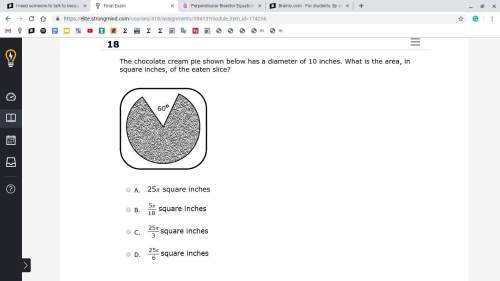REASONING
6
The Method of Common Bases works because exponential functions are one-to-one, i....

Mathematics, 26.10.2020 23:30 aarionna8
REASONING
6
The Method of Common Bases works because exponential functions are one-to-one, i. e. if the outputs are
the same, then the inputs must also be the same. This is what allows us to say that if 2* = 2', then x must be
equal to 3. But it doesn't always work out so easily.
If x² = 5?, can we say that x must be 5? Could it be anything else? Why does this not work out as easily as
the exponential case?
Activate Windows
Go to Settings to activate Windows
V
1 of 1
1
Type here to search
RI
w
N
3:02 PM
10/26/2020

Answers: 2


Another question on Mathematics


Mathematics, 21.06.2019 23:00
Someone answer this asap for the first five terms of a sequence are shown. 5, 11, 23, 47, 95, . . which recursive function defines the nth term in the sequence for n > 1? a. f(n) = f(n - 1) + 6 b) f(n) = f(n - 1) + 48 c) f(n) = 3 • f(n - 1) + 1 d) f(n) = 3 • f(n - 1) - 4
Answers: 1


Mathematics, 22.06.2019 01:10
Is the response to the survey question "did you smoke in the last week question mark "response to the survey question "did you smoke in the last week? " a discrete random variable, a continuous random variable, or not a random variable?
Answers: 1
You know the right answer?
Questions

History, 29.07.2019 21:30


Social Studies, 29.07.2019 21:30

Social Studies, 29.07.2019 21:30


History, 29.07.2019 21:30



Social Studies, 29.07.2019 21:30



Physics, 29.07.2019 21:30




Mathematics, 29.07.2019 21:30


History, 29.07.2019 21:30

History, 29.07.2019 21:30





